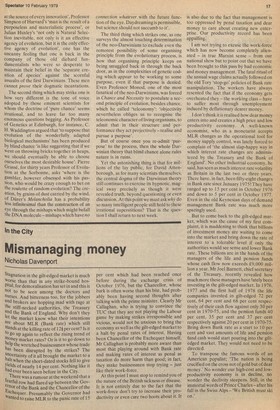In the City
Mismanaging money
Nicholas Davenport
Stagnation in the gilt-edged market is much worse than that in any strike-bound hospital, for demoralisation has set in and this is not to be seen among the doctors and nurses. And bitterness too, for the jobbers and brokers are hopping mad with rage at the stiff-necked authorities, the Treasury and the Bank of England. Why don't they let the market know what their intentions are about MLR (Bank rate) which still stands at the killing rate of 12i per cent? Is it to go up again to reflect the rising trend of Money market rates? Or is it to go down to help the wretched businessmen whose trade has been disrupted by the strikes? The uncertainty of it all brought the market to a 1t when the short-dated stocks fell to give Yields of nearly 14 per cent. Nothing like it had ever been seen before in the City. There was a rumour at the weekend that a fearful row had flared up between the Governor of the Bank and the Chancellor of the Exchequer. Presumably the Governor had Wanted to raise MLR to the panic rate of 15 per cent which had been reached once before during the exchange crisis of October 1976, but the Chancellor, whose bark is often worse than his bite, had probably been having second thoughts after talking with the prime minister. Clearly Mr Callaghan, who is trying to convince the TUC that they are not playing the Labour game by making strikes irresponsible and vicious, would not be anxious to bring the economy as well as the gilt-edged market to a halt by penal rates of interest. Having been Chancellor of the Exchequer himself, Mr Callaghan is probably more aware than most that playing around with Bank rate and making rates of interest as penal as taxation do more harm than good; in fact, they make businessmen stop trying — just like their work-force.
At this point I must stop to remind you of the nature of the British sickness or disease. It is not entirely due to the fact that the work-force don't try to increase their productivity or even care two hoots about it. It is also due to the fact that management is too oppressed by penal taxation and dear money to care about creating new enterprise. Our productivity record has been appalling.
I am not trying to excuse the work-force which has now become completely alienated — in true Marxist sense — from our national show but to point out that we have been brought to this pass by bad economic and money management. The fatal ritual of the annual wage claims actually followed on the old Tory `stop-go' policies of Bank rate manipulation. The workers have always resented the fact that if the economy gets overheated they — the working class — have to suffer most through unemployment induced by deflationary dearer money.
I don't think it is realised how dear money enters into and creates a high price and low productivity economy. A well-known economist, who as a monetarist accepts MLR changes as the operational tool for money supply control, was lately forced to complain of 'the almost slap-happy way in which interest rate changes are administered by the Treasury and the Bank of England'. No other industrial economy, he said, has seen as much interest rate volatility as Britain in the last two or three years. There have, in fact, been fifty-eight changes in Bank rate since January 1975! They have ranged up to 15 per cent in October 1976 and down to 5 per cent in October 1977. Even in the old Keynesian days of demand management Bank rate was much more sparingly used.
But to come back to the gilt-edged market, which was the cause of my first complaint, it is maddening to think that billions of investment money are waiting to come into the market and bring down the rate of interest to a tolerable level if only the authorities would see sense and lower Bank rate. These billions are in the hands of the managers of the life and pension funds whose cash flow now exceeds £9,000 million a year. Mr Joel Barnett, chief secretary of the Treasury, recently revealed how much more these managers have lately been investing in the gilt-edged market. In 1976, 1977 and the first half of 1978 the life companies invested in gilt-edged 72 per cent, 64 per cent and 68 per cent respectively of their cash flow against only 30 per cent in 1970-75, and the pension funds 40 per cent, 35 per cent and 37 per cent respectively against 20 per cent in 1970-75. Bring down Bank rate as a start to 10 per cent and vast amounts of life and pension fund cash would start pouring into the giltedged market. They would not need to be directed.
To transpose the famous words of an American populist; 'The nation is being crucified on the cross not of gold but of dear money.' No wonder our high-cost and lowproductivity economy is in decline, no wonder the declivity steepens. Still, in the immortal words of Prince Charles —after his fall in the Swiss Alps — 'We British must ski on.'


































 Previous page
Previous page